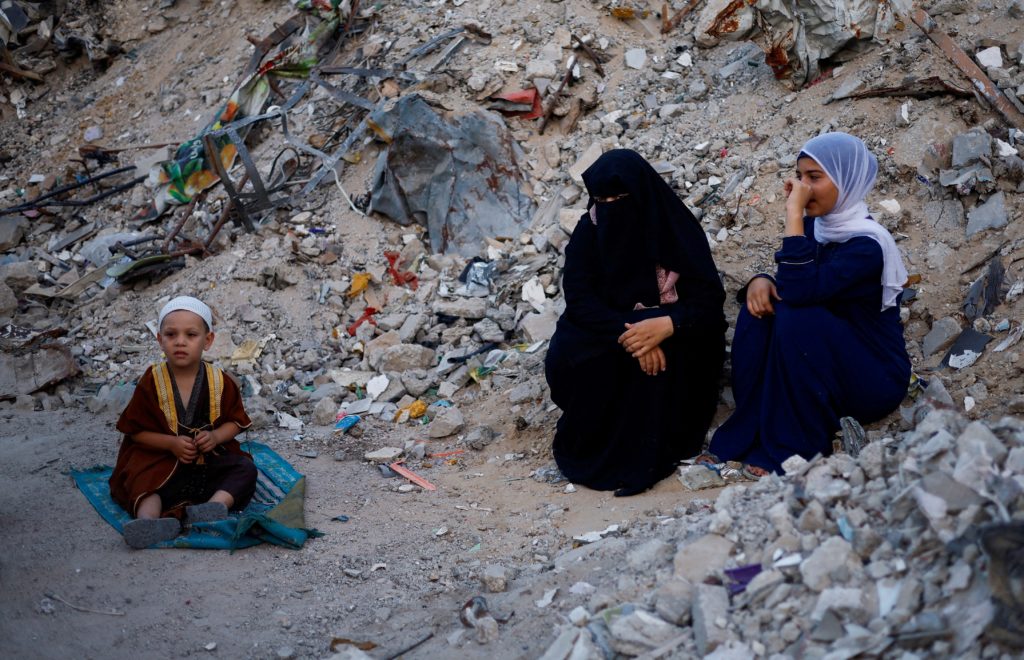News
This Eid al-Adha, a normally joyous Muslim holiday reminds families in Gaza of war’s toll

DEIR AL-BALAH, Gaza Strip (AP) — Final summer season, Palestinians within the Gaza Strip celebrated the Muslim vacation of Eid al-Adha the way in which it’s imagined to be: with massive household feasts, meat shared with these much less lucky, and new garments and presents for youngsters.
However this 12 months, after eight months of devastating warfare between Israel and Hamas, many households will eat canned meals in stifling tents. There’s hardly any meat or livestock at native markets, and no cash for vacation treats or presents — solely warfare, starvation and distress, endlessly.
WATCH: Israel and Hamas seem removed from cease-fire settlement
“There isn’t any Eid this 12 months,” stated Nadia Hamouda, whose daughter was killed within the warfare and who fled from her residence in northern Gaza months in the past and is staying in a tent within the central city of Deir al-Balah. “After we hear the decision to prayer, we cry over these we misplaced and the issues we misplaced, and what has occurred to us, and the way we used to reside earlier than.”
Muslims all over the world will rejoice the four-day Eid al-Adha, the Feast of the Sacrifice, early within the week. It commemorates the Prophet Ibrahim’s willingness to sacrifice his son, Ismail, as recounted within the Quran. Within the Jewish and Christian traditions, Abraham is named to sacrifice his different son, Isaac.
Gaza was impoverished and remoted even earlier than the warfare, however individuals nonetheless managed to rejoice by hanging up colourful decorations, stunning kids with treats and presents, and buying meat or slaughtering livestock to share with these much less lucky.
“It was an actual Eid,” Hamouda stated. “Everybody was comfortable, together with the kids.”
Now a lot of Gaza is in ruins and a lot of the inhabitants of two.3 million Palestinians have fled their houses. After Hamas’ shock assault into Israel on Oct. 7, wherein Palestinian militants killed some 1,200 individuals and took one other 250 hostage, Israel launched an enormous air and floor assault.
The warfare has killed over 37,000 Palestinians, in line with Gaza’s Well being Ministry. It has destroyed most of Gaza’s agriculture and meals manufacturing, leaving individuals reliant on humanitarian help that has been held up by Israeli restrictions and the continued combating.
United Nations companies have warned that over one million individuals — almost half the inhabitants — may expertise the very best stage of hunger within the coming weeks.
In early Might, Egypt shut down its crossing into the southern Gazan metropolis of Rafah after Israel captured the Palestinian facet of it, sealing the one route for individuals to enter or go away the territory. Meaning nearly no Palestinians from Gaza will have the ability to make the annual Hajj pilgrimage that precedes the Eid.
READ MORE: Muslims converge at Mount Arafat to worship as Hajj pilgrimage reaches its peak
Ashraf Sahwiel, who was amongst lots of of 1000’s of Palestinians who fled from Gaza Metropolis earlier within the warfare and can be residing in a tent, has no concept when or if he’ll have the ability to return.
“We don’t even know what occurred to our homes or whether or not we’ll have the ability to reside in them once more, or if it’s even attainable to rebuild,” he stated.
Abdelsattar al-Batsh stated he and his household of seven haven’t eaten meat because the warfare started. A kilogram (2 kilos) of meat prices 200 shekels (round $50). A reside sheep, which might be purchased for as little as $200 earlier than the warfare, now prices $1,300 — if it’s even obtainable.
“As we speak, there may be solely warfare. No cash. No work. Our homes have been destroyed. I’ve nothing,” al-Batsh stated.
Iyad al-Bayouk, who owns a now-shuttered cattle farm in southern Gaza, stated extreme shortages of each livestock and feed attributable to Israel’s blockade have pushed up costs. Some native farms have been become shelters.
Mohammed Abdel Rahim, who has been sheltering in a constructing in an empty cattle farm in central Gaza for months, stated the farm-turned-shelter was significantly dangerous within the winter, when it smelled like animals and was infested with bugs. As the warmth set in, the bottom dried out, making it extra bearable, he stated.
Abdelkarim Motawq, one other displaced Palestinian from northern Gaza, used to work within the native meat business, which did brisk enterprise forward of the vacation. This 12 months, his household can solely afford rice and beans.
“I want I may work once more,” he stated. “It was a busy season for me, throughout which I’d carry cash residence and purchase meals, clothes, nuts, and meat for my kids. However in the present day there’s nothing left.”
Khaled reported from Cairo.
